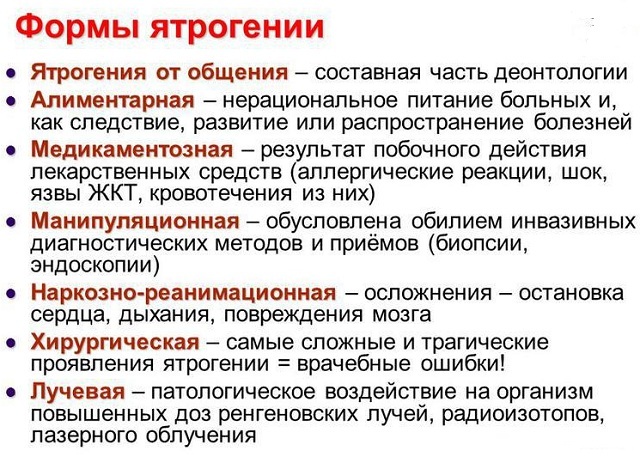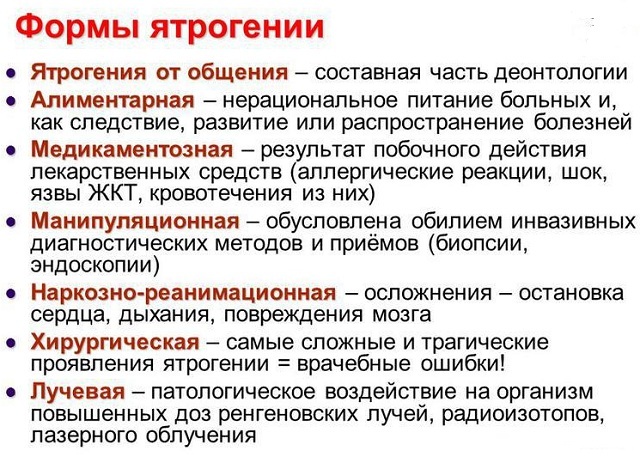 In the 1920s, a psychiatrist Bleuler from Switzerland noted that various types of inappropriate thinking occur when examining a patient, as well as in identifying early clinical signs of the disease, when a person is concerned about his condition and is inclined to misconstrue a changing state of health.
In the 1920s, a psychiatrist Bleuler from Switzerland noted that various types of inappropriate thinking occur when examining a patient, as well as in identifying early clinical signs of the disease, when a person is concerned about his condition and is inclined to misconstrue a changing state of health.
This is due to mistrust of the patient to the medical staff, fears, etc. Such effects of auto-suggestion are called eugenia.
Bleuler used the concept of "iatrogenic" to describe such phenomena. A few years later, the psychiatrist Bumke described the cases of the negative impact of physicians on the psyche of patients and fixed the term "iatrogenia" for such a violation.
In order to disclose the concept of "iatrogenia", the term "iatropathogeny", which occurs in foreign sources, should be considered.
So, for example, Buchal and Konechny interpret this phenomenon as a medical-diagnostic method, as a result of which the health worker is doing harm to the patient. In connection with this, the term "sorption" is also used - harm done by nurses.
About iatrogenic disorders
Iatrogenic disorder is an unfavorable modification of the psyche due to the impressive effects of medical workers on patients, which causes neuroses, psychological trauma, etc.
It is possible to give one more definition of iatrogenia, a disease caused by patient agitationsdue to the negative impact of the words and actions of the health worker.
Jores in his works writes that the doctor should carefully and very carefully choose words. Bekhterev emphasizes that in  patients "waiting emotions" contribute to the appearance of new conditioned reflexes.
patients "waiting emotions" contribute to the appearance of new conditioned reflexes.
The patient is in a state of emotional duality and uncertainty: feelings of hope are interspersed with fear and uncertainty. The environment depends largely on which of these elements will outweigh. Therefore, iatrogenic disorder can be compared to negative therapy: a paramedic acts as a poison, and not as a medicine.
Fear and uncertainty can not protect even the available knowledge in the field of medicine. At the same time, the real perception of even a serious illness in an informed and mentally stable patient allows him to bear the ailment more calmly, switch to some activity to the best of his abilities.
Sources of failure
In medical practice among the main sources of iatrogenium are isolated:
- . Individual circumstances of : incorrectly conducted health education can cause collective mental iatrogenia.
- Personality of health workers .This includes categorical judgments, overestimated self-esteem. About these specialists say "all-knowing doctor."They easily inspire patients with their point of view and views.
- Personality of the patient .Excessively hypochondriacal, hypochondriacal, fearful, vulnerable people are more prone to iatrogenic diseases than others. In some cases, the personality is so pronounced that with so-called. Iatrogenic effects of a health worker's guilt may not be there. For example, the patient himself thinks up for the doctor, distorts his expressions, tears words out of context.
- There are other reasons. The disorder often arises because of the careless comment on the medical characteristics of the patient's medical condition .Doctors should follow not only their statements, but even facial expressions and gestures.

Bright types of iatrogenia - cardiopathy. The phenomenon is observed in people prone to psychoneurotic reactions. Deviations can develop, for example, after an ambulance doctor recommended the coronary strict bed rest.
On the one hand, the doctor in this situation does not want to admit serious cardiovascular complications, and on the other hand the patient pays attention to the words and actions of the health worker.
There are cases when middle medical personnel are guilty of iatrogenic violations. Hardy described such errors with the term "sorcogeny".
Yatropathy as a Concomitant Disorder
Yatropathy is a negative impact on the patient due to incorrect actions or prescriptions of the doctor or unreasonable use of instrumental and laboratory studies to the detriment of human health.
 It should be noted the close relationship between iatropathia and iatrogenia. Mental changes that occur iatrogenic way, health workers are often interpreted as epilepsy, asthma, gastropathy or borderline forms of neuropsychiatric disorders. Treatment of such "diseases" can cause the opposite effect.
It should be noted the close relationship between iatropathia and iatrogenia. Mental changes that occur iatrogenic way, health workers are often interpreted as epilepsy, asthma, gastropathy or borderline forms of neuropsychiatric disorders. Treatment of such "diseases" can cause the opposite effect.
An incorrectly diagnosed diagnosis may give rise to iatrogenesis, and further therapy based on an incorrect diagnosis causes the patient to have iatropathy. Later, if the doctor did not notice his mistake, a vicious circle is created that is very unfavorable for the patient. An increasingly increasing negative effect of this "treatment" is created, due to the influence of the tandem "iatrogenia-yatropatiya."
It should be noted that the emergence of new laboratory research methods and the creation of innovative diagnostic methods are definitely an important achievement in medicine. However, their abuse at the expense of medical examination of the patient is not allowed. Because of the increase in the number of diagnostic auxiliary methods, medical science can turn into the hands of individual specialists into laboratory science.
Regardless of whether the surgeon is performing the wrong operation without taking into account all the pros and cons of radical supervision, whether the patient's doctor treats the patient with a pharmaceutical agent even in the usual dose - in all of the cases listed in the worsening of the patient's condition or the onset of a new diseaseactually guilty of a health worker.
Classification of yatropathies:
- Violation of the traumatic etiology of : traumatizing the child during labor, consequences of improper surgical intervention, lumbar puncture, anesthesia, consequences of disrupting the technique of performing other invasive interventions, etc.
- Disease of intoxication etiology .This includes incorrectly selected medication and disruption of its dosage, complications that arise because of the patient's predisposition to an allergy to a certain toxic drug, the introduction of unnecessary medication into the body. This group can also include the consequences for citizens of ill-conceived, mass application of pharmacological agents for self-treatment, underestimation of the negative effects of a toxic agent on the body, contamination of organs and body systems with various and randomly taken medications.
- Infectious etiology disorders .This includes the negative consequences after the use of vaccines, as well as the multiple complications that develop as a result of this through the fault of health workers.
- Yatropathies organizational etiology .They arise because of irrational organization of diagnostic activities, treatment and care of patients.

Analysis of errors in the health care system is an indispensable condition for the prevention of iatrogenic and yatropathies. If a medical worker has a growing number of errors, it is important that the head analyzes possible psycho-emotional reasons for this situation.



